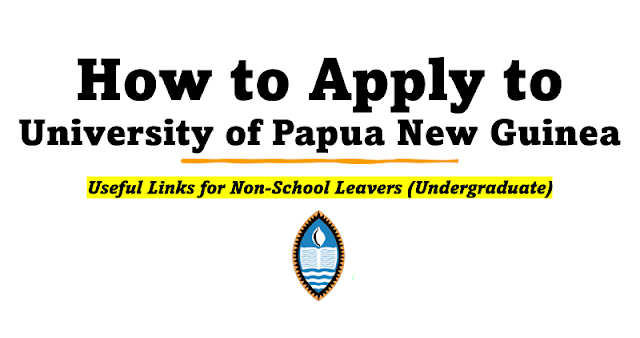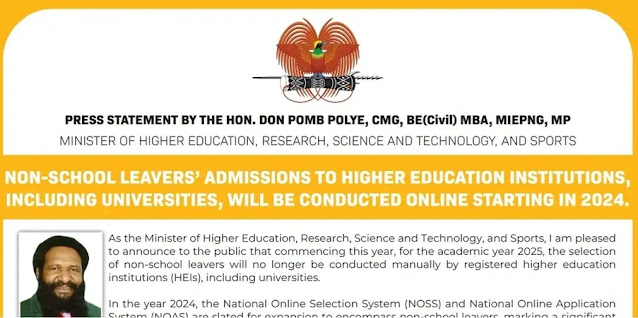The application for non-school leavers intake for 2025 for many universities and colleges is now open. Individuals, who have taken a break from formal education have the chance to pursue their studies at PNG's esteemed universities and colleges. This article provides a comprehensive guide on the application process for non-school leavers at prestigious institutions like the University of Papua New Guinea (UPNG) and the Papua New Guinea University of Technology (Unitech), alongside other prominent universities including UOG, PAU, DWU, WPU, and PNGUNRE.
2024 Moving from Paper to Online Applications
Traditionally, non-school leavers had to navigate a maze of paperwork, downloading and submitting application forms manually. Thankfully, the digital age is transforming this process, especially at PNG's premier universities.
UPNG and Unitech have become pioneers in this arena, offering streamlined online applications for non-school leavers. This shift boasts several advantages: eliminates the need for physical copies, simplifies the process for applicants in remote areas, and enhances overall efficiency.
While UPNG and Unitech are leading the charge with online applications, some universities in PNG haven't yet embraced this digital revolution. Universities like the University of Goroka (UOG), Pacific Adventist University (PAU), Divine Word University (DWU), Western Pacific University (WPU), and the Papua New Guinea University of Natural Resources and Environment (PNGUNRE) still require non-school leavers to download and submit application forms manually via their websites or social media pages.
For the 2025 academic year, non-school leavers must initiate their application process well in advance, ideally earlier in July 2024. Regardless of whether the application is online or manual, meticulously reviewing the specific guidelines set forth by each university is paramount.
Non-School Leavers Admission Requirements
Admission Requirements
Admission requirements for non-school leavers vary across universities. Here's a glimpse into some general criteria:
- Completion of diploma or degree programs from recognized institutions within PNG or abroad.
- Prior fulfilment of the National Matriculation Requirements from accredited National and Secondary High Schools, or an equivalent qualification obtained before 2023. (For example, applicants for the 2024 intake must have completed Grade 12 between 2017 and 2021.)
- A minimum grade point average of 2.4 and a B grade or higher in English or Mathematics.
- Officially stamped and signed matriculation certificates.
University-Specific Information: UPNG, Unitech, UOG, PAU, DWU, WPU, PNGUNRE
Obtaining in-depth details about the application process for each university is effortless, even though waiting for the application form to be released can be daunting :).
Visit the official websites or social media pages, particularly those of UPNG and Unitech, to provide comprehensive instructions to guide you through the process.
Follow the links provided in this article to check if your desired universities have released their 2024 application forms PDF and online applications for 2025 intakes.
Financial Aid: Scholarships for Aspiring Students
Tertiary Education Study Assistance Scheme (TESAS): The journey towards higher education can be bolstered by scholarships specifically designed for non-school leavers. The Tertiary Education Study Assistance Scheme (TESAS), a PNG government program, is a prime example. Scholarships like TESAS offer financial aid to qualified students.
Higher Education Loan Program (HELP): In addition to TESAS, the Higher Education Loan Program (HELP) is another noteworthy initiative. This government-backed program aims to bridge the financial gap for students seeking access to tertiary education.
In closure
The shift towards online applications for non-school leavers signifies a significant leap forward in making PNG's higher education landscape more accessible. While leading institutions like UPNG and Unitech are at the forefront of this digital transformation, other universities are expected to follow suit.
Currently, non-school leavers applying to UOG, PAU, DWU, WPU, and PNGUNRE will need to navigate the traditional application process. So, whether your aspirations lie with UPNG, Unitech, UOG, PAU, DWU, WPU, or PNGUNRE, kickstart your application process in 2024 for the 2025 academic year.
If you have any questions, leave a comment below.
----
IMPORTANT SIDE NOTE: The Ministry of Higher Education, through the former minister, has issued a press statement indicating that the application process for non-school leavers will transition to an online format via the DHERST National Online Application System and will be included in the National Online Selection Process. However, the status of this development remains unclear following the dismissal of the minister, and the Department of Higher Education has yet to provide clarity on the matter. (Refer to this PNG Insight video on YouTube for more information, or read about it here). In the meantime, we recommend reaching out to your preferred universities for further guidance and proceeding with the application as instructed.

















-PNG%20INSIGHT.jpg)
-PNG%20INSIGHT.jpg)

